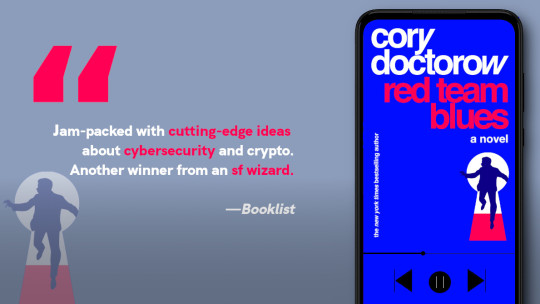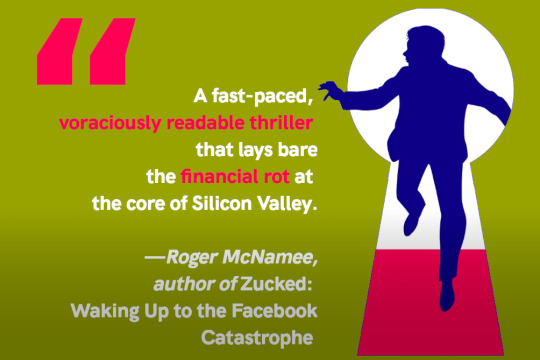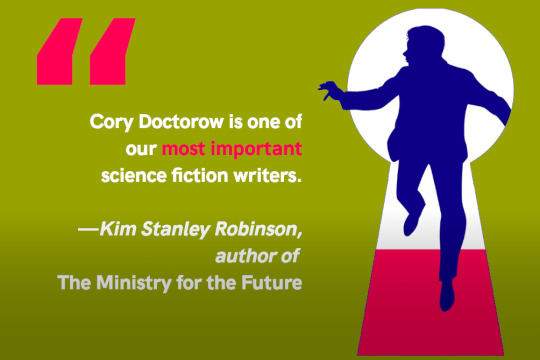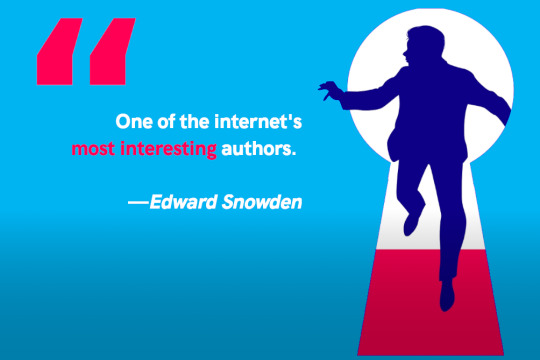#chokepoint capitalism
Text
This is your brain on fraud apologetics

In 1998, two Stanford students published a paper in Computer Networks entitled “The Anatomy of a Large-Scale Hypertextual Web Search Engine,” in which they wrote, “Advertising funded search engines will be inherently biased towards the advertisers and away from the needs of consumers.”
https://research.google/pubs/pub334/
If you’d like an essay-formatted version of this post to read or share, here’s a link to it on pluralistic.net, my surveillance-free, ad-free, tracker-free blog:
https://pluralistic.net/2023/02/24/passive-income/#swiss-cheese-security
The co-authors were Lawrence Page and Sergey Brin, and the “large-scale hypertextual web search-engine” they were describing was their new project, which they called “Google.” They were 100% correct — prescient, even!
On Wednesday night, a friend came over to watch some TV with us. We ordered out. We got scammed. We searched for a great local Thai place we like called Kiin and clicked a sponsored link for a Wix site called “Kiinthaila.com.” We should have clicked the third link down (kiinthaiburbank.com).
We got scammed. The Wix site was a lookalike for Kiin Thai, which marked up their prices by 15% and relayed the order to our local, mom-and-pop, one-branch restaurant. The restaurant knew it, too — they called us and told us they were canceling the order, and said we could still come get our food, but we’d have to call Amex to reverse the charge.
As it turned out, the scammers double-billed us for our order. I called Amex, who advised us to call back in a couple days when the charge posted to cancel it — in other words, they were treating it as a regular customer dispute, and not a systemic, widespread fraud (there’s no way this scammer is just doing this for one restaurant).
In the grand scheme of things, this is a minor hassle, but boy, it’s haunting to watch the quarter-century old prophecy of Brin and Page coming true. Search Google for carpenters, plumbers, gas-stations, locksmiths, concert tickets, entry visas, jobs at the US Post Office or (not making this up) tech support for Google products, and the top result will be a paid ad for a scam. Sometimes it’s several of the top ads.
This kind of “intermediation” business is actually revered in business-schools. As Douglas Rushkoff has written, the modern business wisdom reveres “going meta” — not doing anything useful, but rather, creating a chokepoint between people who do useful things and people who want to pay for those things, and squatting there, collecting rent:
https://rushkoff.medium.com/going-meta-d42c6a09225e
It’s the ultimate passive income/rise and grind side-hustle: It wouldn’t surprise me in the least to discover a whole festering nest of creeps on Tiktok talking about how they pay Mechanical Turks to produce these lookalike sites at scale.
This mindset is so pervasive that people running companies with billions in revenue and massive hoards of venture capital run exactly the same scam. During lockdown, companies like Doordash, Grubhub and Uber Eats stood up predatory lookalike websites for local restaurants, without their consent, and played monster-in-the-middle, tricking diners into ordering through them:
https://pluralistic.net/2020/09/19/we-are-beautiful/#man-in-the-middle
These delivery app companies were playing a classic enshittification game: first they directed surpluses to customers to lock them in (heavily discounting food), then they directed surplus to restaurants (preferential search results, free delivery, low commissions) — then, having locked in both consumers and producers, they harvested the surplus for themselves.
Today, delivery apps charge massive premiums to both eaters and restaurants, load up every order with junk fees, and clone the most successful restaurants out of ghost kitchens — shipping containers in parking lots crammed with low-waged workers cranking out orders for 15 different fake “virtual restaurants”:
https://pluralistic.net/2020/12/01/autophagic-buckeyes/#subsidized-autophagia
Delivery apps speedran the enshittification cycle, but Google took a slower path to get there. The company has locked in billions of users (e.g. by paying billions to be the default search on Safari and Firefox and using legal bullying to block third party Android device-makers from pre-installing browsers other than Chrome). For years, it’s been leveraging our lock-in to prey on small businesses, getting them to set up Google Business Profiles.
These profiles are supposed to help Google distinguish between real sellers and scammers. But Kiin Thai has a Google Business Profile, and searching for “kiin thai burbank” brings up a “Knowledge Panel” with the correct website address — on a page that is headed with a link to a scam website for the same business. Google, in other words, has everything it needs to flag lookalike sites and confirm them with their registered owners. It would cost Google money to do this — engineer-time to build and maintain the system, content moderator time to manually check flagged listings, and lost ad-revenue from scammers — but letting the scams flourish makes Google money, at the expense of Google users and Google business customers.
Now, Google has an answer for this: they tell merchants who are being impersonated by ad-buying scammers that all they need to do is outbid them for the top ad-spot. This is a common approach — Amazon has a $31b/year “ad business” that’s mostly its own platform sellers bidding against each other to show you fake results for your query. The first five screens of Amazon search results are 50% ads:
https://pluralistic.net/2022/11/28/enshittification/#relentless-payola
This is “going meta,” so naturally, Meta is doing it too: Facebook and Instagram have announced a $12/month “verification” badge that will let you report impersonation and tweak the algorithm to make it more likely that the posts you make are shown to the people who explicitly asked to see them:
https://www.vox.com/recode/2023/2/21/23609375/meta-verified-twitter-blue-checkmark-badge-instagram-facebook
The corollary of this, of course, is that if you don’t pay, they won’t police your impersonators, and they won’t show your posts to the people who asked to see them. This is pure enshittification — the surplus from users and business customers is harvested for the benefit of the platform owners:
https://pluralistic.net/2023/01/21/potemkin-ai/#hey-guys
The idea that merchants should master the platforms as a means of keeping us safe from their impersonators is a hollow joke. For one thing, the rules change all the time, as the platforms endlessly twiddle the knobs that determine what gets shown to whom:
https://doctorow.medium.com/twiddler-1b5c9690cce6
And they refuse to tell anyone what the rules are, because if they told you what the rules were, you’d be able to bypass them. Content moderation is the only infosec domain where “security through obscurity” doesn’t get laughed out of the room:
https://doctorow.medium.com/como-is-infosec-307f87004563
Worse: the one thing the platforms do hunt down and exterminate with extreme prejudice is anything that users or business-customers use to twiddle back — add-ons and plugins and jailbreaks that override their poor choices with better ones:
https://www.theverge.com/2022/9/29/23378541/the-og-app-instagram-clone-pulled-from-app-store
As I was submitting complaints about the fake Kiin scam-site (and Amex’s handling of my fraud call) to the FTC, the California Attorney General, the Consumer Finance Protection Bureau and Wix, I wrote a little Twitter thread about what a gross scam this is:
https://twitter.com/doctorow/status/1628948906657878016
The thread got more than two million reads and got picked up by Hacker News and other sites. While most of the responses evinced solidarity and frustration and recounted similar incidents in other domains, a significant plurality of the replies were scam apologetics — messages from people who wanted to explain why this wasn’t a problem after all.
The most common of these was victim-blaming: “you should have used an adblocker” or “never click the sponsored link.” Of course, I do use an ad-blocker — but this order was placed with a mobile browser, after an absentminded query into the Google search-box permanently placed on the home screen, which opens results in Chrome (where I don’t have an ad-blocker, so I can see material behind an ad-blocker-blocker), not Firefox (which does have an ad-blocker).
Now, I also have a PiHole on my home LAN, which blocks most ads even in a default browser — but earlier this day, I’d been on a public wifi network that was erroneously blocking a website (the always excellent superpunch.net) so I’d turned my wifi off, which meant the connection came over my phone’s 5G connection, bypassing the PiHole:
https://pluralistic.net/2022/04/28/shut-yer-pi-hole/
“Don’t click a sponsored link” — well, the irony here is that if you habitually use a browser with an ad-blocker, and you backstop it with a PiHole, you never see sponsored links, so it’s easy to miss the tiny “Sponsored” notification beside the search result. That goes double if you’re relaxing with a dinner guest on the sofa and ordering dinner while chatting.
There’s a name for this kind of security failure: the Swiss Cheese Model. We all have multiple defenses (in my case: foreknowledge of Google’s ad-scam problem, an ad-blocker in my browser, LAN-wide ad sinkholing). We also have multiple vulnerabilities (in my case: forgetting I was on 5G, being distracted by conversation, using a mobile device with a permanent insecure search bar on the homescreen, and being so accustomed to ad-blocked results that I got out of the habit of checking whether a result was an ad).
If you think you aren’t vulnerable to scams, you’re wrong — and your confidence in your invulnerability actually increases your risk. This isn’t the first time I’ve been scammed, and it won’t be the last — and every time, it’s been a Swiss Cheese failure, where all the holes in all my defenses lined up for a brief instant and left me vulnerable:
https://locusmag.com/2010/05/cory-doctorow-persistence-pays-parasites/
Other apologetics: “just call the restaurant rather than using its website.” Look, I know the people who say this don’t think I have a time-machine I can use to travel back to the 1980s and retrieve a Yellow Pages, but it’s hard not to snark at them, just the same. Scammers don’t just set up fake websites for your local businesses — they staff them with fake call-centers, too. The same search that takes you to a fake website will also take you to a fake phone number.
Finally, there’s “What do you expect Google to do? They can’t possibly detect this kind of scam.” But they can. Indeed, they are better situated to discover these scams than anyone else, because they have their business profiles, with verified contact information for the merchants being impersonated. When they get an ad that seems to be for the same business but to a different website, they could interrupt the ad process to confirm it with their verified contact info.
Instead, they choose to avoid the expense, and pocket the ad revenue. If a company promises to “to organize the world’s information and make it universally accessible and useful,” I think we have the right to demand these kinds of basic countermeasures:
https://www.google.com/search/howsearchworks/our-approach/
The same goes for Amex: when a merchant is scamming customers, they shouldn’t treat complaints as “chargebacks” — they should treat them as reports of a crime in progress. Amex has the bird’s eye view of their transaction flow and when a customer reports a scam, they can backtrack it to see if the same scammer is doing this with other merchants — but the credit card companies make money by not chasing down fraud:
https://www.buzzfeednews.com/article/rosalindadams/mastercard-visa-fraud
Wix also has platform-scale analytics that they could use to detect and interdict this kind of fraud — when a scammer creates a hundred lookalike websites for restaurants and uses Wix’s merchant services to process payments for them, that could trigger human review — but it didn’t.
Where do all of these apologetics come from? Why are people so eager to leap to the defense of scammers and their adtech and fintech enablers? Why is there such an impulse to victim-blame?
I think it’s fear: in their hearts, people — especially techies — know that they, too, are vulnerable to these ripoffs, but they don’t want to admit it. They want to convince themselves that the person who got scammed made an easily avoidable mistake, and that they themselves will never make a similar mistake.
This is doubly true for readerships on tech-heavy forums like Twitter or (especially) Hacker News. These readers know just how many vulnerabilities there are — how many holes are in their Swiss cheese — and they are also overexposed to rise-and-grind/passive income rhetoric.
This produces a powerful cognitive dissonance: “If all the ‘entrepreneurs’ I worship are just laying traps for the unwary, and if I am sometimes unwary, then I’m cheering on the authors of my future enduring misery.” The only way to resolve this dissonance — short of re-evaluating your view of platform capitalism or questioning your own immunity to scams — is to blame the victim.
The median Hacker News reader has to somehow resolve the tension between “just install an adblocker” and “Chrome’s extension sandbox is a dumpster fire and it’s basically impossible to know whether any add-on you install can steal every keystroke and all your other data”:
https://mattfrisbie.substack.com/p/spy-chrome-extension
In my Twitter thread, I called this “the worst of all possible timelines.” Everything we do is mediated by gigantic, surveillant monopolists that spy on us comprehensively from asshole to appetite — but none of them, not a 20th century payment giant nor a 21st century search giant — can bestir itself to use that data to keep us safe from scams.
Next Thu (Mar 2) I'll be in Brussels for Antitrust, Regulation and the Political Economy, along with a who's-who of European and US trustbusters. It's livestreamed, and both in-person and virtual attendance are free:
https://www.brusselsconference.com/registration
On Fri (Mar 3), I'll be in Graz for the Elevate Festival:
https://elevate.at/diskurs/programm/event/e23doctorow/
[Image ID: A modified version of Hieronymus Bosch's painting 'The Conjurer,' which depicts a scam artist playing a shell-game for a group of gawking rubes. The image has been modified so that the scam artist's table has a Google logo and the pea he is triumphantly holding aloft bears the 'Sponsored' wordmark that appears alongside Google search results.]
#pluralistic#victim blaming#fraud#going meta#douglas rushkoff#ad-tech#local search#wix#amex#thai food#business#rent-seeking#entrepreneurship#passive income#chokepoint capitalism#platform lawyers
2K notes
·
View notes
Text
winning moment

#pluralistic#victim blaming#fraud#going meta#douglas rushkoff#ad-tech#local search#wix#amex#thai food#business#rent-seeking#entrepreneurship#passive income#chokepoint capitalism#platform lawyers#relevant#late stage capitalism#capitalism#communism#socialism#anarchism#economics#home values#rent#landlords#vampires#making money#making money online#make money with affiliate marketing
11 notes
·
View notes
Text
“Here is how platforms die: first, they are good to their users; then they abuse their users to make things better for their business customers; finally, they abuse those business customers to claw back all the value for themselves. Then, they die.”
– Cory Doctorow, Chokepoint Capitalism: How Big Tech and Big Content Captured Creative Labor Markets and How We'll Win Them Back, Beacon Press, 2022.
10 notes
·
View notes
Text
youtube
Unity's Plan Won't Work, but Someone Else's Will by Pillar of Garbage
#thought provoking#unity#evils of capitalism#techno feudalism#chokepoint capitalism#enshittification#Youtube
10 notes
·
View notes
Text
I'm finding Rebecca Giblin and Cory Doctorow's Chokepoint Capitalism relevant to the tabletop games space right now, be it last year's acquisition of the Asmodee monolith by the many-tentacled Embracer Group or WotC's plans for revoking the twenty-three-year-old OGL and anointing Kickstarter as their preferred crowdfunding platform (via https://gizmodo.com/dnd-wizards-of-the-coast-ogl-1-1-open-gaming-license-1849950634 )
7 notes
·
View notes
Text
what is Artificial Intelligence AI
Artificial Intelligence (AI) is a field of computer science that focuses on the development of machines and software that can perform tasks that typically require human intelligence, such as perception, reasoning, learning, decision-making, and natural language processing. AI systems are designed to analyse data, recognize patterns, and make predictions or decisions based on that data. The goal of AI is to create machines that can think, reason, and learn like humans, and to develop intelligent systems that can automate tasks and improve our lives in various ways.
How Does AI Work
AI systems are designed to analyze and process vast amounts of data in real-time and derive insights from that data to make predictions or take actions. There are three main types of AI systems: rule-based systems, machine learning, and deep learning.
1.Rule-Based Systems
Rule-based systems are the simplest form of AI and rely on a set of pre-defined rules to make decisions. These systems work by analyzing data and applying specific rules to make decisions. For example, a rule-based system might be programmed to diagnose a disease based on a set of symptoms. The system would analyze the data, apply the rules, and then provide a diagnosis based on the outcome.
2.Machine Learning
Machine learning is a more advanced form of AI that involves teaching machines to learn from data without being explicitly programmed. This is done through a process known as training, in which machines are fed large amounts of data and algorithms are used to identify patterns and learn from the data. machinelearningmastery/ The machine then applies what it has learned to new data to make predictions or take actions.
There are three main types of machine learning: supervised learning, unsupervised learning, and reinforcement learning.
Supervised Learning: Supervised learning is a type of machine learning where the algorithm learns to make predictions by analyzing labelled training data. In this type of learning, the algorithm is trained using input-output pairs, where the input is a set of features or attributes, and the output is a labelled target value. The goal of supervised learning is to find a mapping between the input and output variables so that the algorithm can accurately predict the output for new, unseen inputs.
Examples of supervised learning include predicting the price of a house based on its features or diagnosing a patient’s illness based on their symptoms.
Unsupervised Learning: Unsupervised learning is a type of machine learning where the algorithm learns to identify patterns and relationships in unlabelled data. In unsupervised learning, the algorithm is given a set of inputs without any corresponding output labels, and it must find patterns or groupings in the data on its own.
Examples of unsupervised learning include identifying groups of similar customers in a marketing dataset or finding patterns in unstructured text data.
#pluralistic#luddie#chokepoint capitalism#generative ai#artificial intelligence#voice acting#labor#creative labor#exclusive rights regimes#copyright#copyfight#careful what you wish for#machine learning#ai#ml#blurred lines#melancholy elephants
2 notes
·
View notes
Text
"After spending billions on the vanity project of blasting himself into space, Bezos thanked Amazon’s employees and customers, noting that they “paid for all of this.”35 He was right, and many of them no doubt suffered from food, housing, and healthcare precarity as a result."
Chokepoint Capitalism by Cory Doctorow and Rebecca Giblin
2 notes
·
View notes
Text
“Corporations rely on the illusion of corporate personhood, using expensively crafted “brand identities“ to present themselves to us as having personalities aimed at making us feel an emotional connection — and like we’re all in this together. But firms have no intrinsic virtues. They are not our friends. If a corporation is a “person”, it’s an immortal colony organism that treats human beings as inconvenient gut flora. It doesn’t have a personality, and it doesn’t have ethics. Its sole imperative is to do whatever it can get away with to extract maximum economic value from humans and the planet.”
- Chokepoint Capitalism, Rebecca Gilpin and Cory Doctorow
#chokepoint capitalism#economy#cory doctorow#Rebecca Gilpin#theory of change#marxism#anti capitalism#big tech#little brother
1 note
·
View note
Text
Okay! Reading time.
Time to read more of Chokepoint Capitalism: How Big Tech and Big Content Captured Creative Labor Markets and How We'll Win Them Back, written by Rebecca Giblin and Cory Doctorow.
I'm on the third chapter which is about the news. I finished the second chapter which was about Amazon and how they took over the book and publishing industry. Really good read, I highly recommend it. It's very informative.
#books#nonfiction#cory doctorow#pluralistic#capitalism#chokepoint capitalism#nonfiction books#books and reading#books and libraries#bookworm#news#amazon#publishing#publishing industry
0 notes
Text
Foods to eat on a ketogenic diet

If you're considering starting a ketogenic diet, one of the most important things to know is what you should and shouldn't be eating. The goal of the ketogenic diet is to enter a state of ketosis, which is when your body switches from burning carbohydrates for energy to burning fat. In order to do this, you need to drastically reduce your carbohydrate intake and increase your fat intake. Here are some foods to focus on when following a ketogenic diet:1. Meat: Beef, chicken, pork, lamb, and other types of meat are all great sources of protein and healthy fats.2. Fish: Fatty fish like salmon, mackerel, and sardines are rich in omega-3

#pluralistic#victim blaming#fraud#going meta#douglas rushkoff#ad-tech#local search#wix#amex#thai food#business#chokepoint capitalism#platform lawyers
0 notes
Text
Kickstarting the Red Team Blues audiobook, which Amazon won't sell (read by Wil Wheaton!)

Red Team Blues is my next novel, a post-cyberpunk anti-finance finance thriller; it’s a major title for my publishers Tor Books and Head of Zeus, and it’s swept the trade press with starred reviews all ‘round. Despite all that, Audible will not sell the audiobook. In fact, Audible won’t sell any of my audiobooks. Instead, I have to independently produce them and sell them through Kickstarter:
https://www.kickstarter.com/projects/doctorow/red-team-blues-another-audiobook-that-amazon-wont-sell
If you’d like an essay-formatted version of this post to read or share, here’s a link to it on pluralistic.net, my surveillance-free, ad-free, tracker-free blog:
https://pluralistic.net/2023/03/21/anti-finance-finance-thriller/#marty-hench
Audible is Amazon’s monopoly audiobook platform. It has a death-grip on the audiobook market, commanding more than 90% of genre audiobook sales, and every single one of those audiobooks is sold with Amazon’s DRM on it. That means that you can’t break up with Amazon without throwing away those audiobooks. Under the 1998 Digital Millennium Copyright Act, I can’t give you a tool to convert my own copyrighted audiobooks to a non-Amazon format. Doing so is a felony carrying a five year prison sentence and a $500,000 fine for an act that in no way infringes anyone’s copyright! Indeed, merely infringing copyright is much less illegal than removing Amazon’s mandatory DRM from my own books!

I’ve got amazing publishers who support my crusade against DRM, but they’re not charities. If they can’t sell my audiobooks on the platform that represents 90% of the market, they’re not going to make audio editions at all. Instead, I make my own audiobooks, using brilliant voice actors like Amber Benson and @neil-gaiman, and I sell them everywhere except Audible.
Doing this isn’t cheap: I’m paying for an incredible studio (Skyboat Media), a world-class director (Gabrielle de Cuir), top-notch sound editing and mastering, and, of course, killer narrators. And while indie audiobook platforms like Libro.fm and downpour.com are amazing, the brutal fees extracted by Apple and Google on app sales means that users have to jump through a thousand hoops to shop with indie stores. Most audiobook listeners don’t even know that these stores exist: if a title isn’t available on Audible, they assume no audiobook exists.

That’s where Kickstarter comes in: twice now, I’ve crowdfunded presales of my audiobooks through KS, and these campaigns were astoundingly successful, smashing records and selling thousands of audiobooks. These campaigns didn’t just pay my bills (especially during lockdown, when our household income plunged), but they also showed other authors that it was possible to evade Amazon’s monopoly chokepoint and sell books that aren’t sticky-traps for Audible’s walled garden/prison:
https://www.publishersweekly.com/pw/by-topic/columns-and-blogs/cory-doctorow/article/90282-we-wrote-a-book-about-why-audible-won-t-sell-our-book-and-snuck-it-onto-audible.html
And today, I’m launching the Kickstarter for Red Team Blues, and even by the standards of my previous efforts, I think this one’s gonna be incredible.
https://www.kickstarter.com/projects/doctorow/red-team-blues-another-audiobook-that-amazon-wont-sell
For starters, there’s the narrator: @wilwheaton, whose work on my previous books is outstanding, hands-down my favorite (don’t tell my other narrators! They’re great too!):
https://wilwheaton.net/
Beyond Wil’s narration, there’s the subject matter. The hero of Red Team Blues is a hard-charging forensic accountant who’s untangled every Silicon Valley finance scam since he fell in love with spreadsheets as as a MIT freshman, dropped out, got his CPA ticket, and moved west. Now, at the age of 67, Marty Hench is ready to retire, but a dear old friend — a legendary cryptographer — drags him back for one last job — locating the stolen keys to the backdoor he foolishly hid in a cryptocurrency that’s worth more than a billion dollars.

That’s the starting gun for a “grabby next-Tuesday thriller” that sees Marty in between three-letter agencies and international crime syndicates, all of whom view digital technology as a carrier medium for scams, violence and predation. Marty’s final adventure involves dodgy banks, crooked crypto, and complicit officials in a fallen paradise where computers’ libertory promise has been sucked dry by billionaire vampires.
It’s a pretty contemporary story, in other words.
I wrote this one before SVB, before Sam Bankman0Fried and FTX — just like I wrote Little Brother before Snowden’s revelations. It’s not that I’m prescient — fortune-telling is a fatalist’s delusion — it’s that these phenomena are just the most spectacular, most recent examples in a long string of ghastly and increasingly dire scandals.
Red Team Blues blasted out of my fingertips in six weeks flat, during lockdown, when technology was simultaneously a lifeline, connecting us to one another during our enforced isolation; and a tool of predatory control, as bossware turned our “work from home” into “live at work.”
The last time I wrote a book that quickly, it was Little Brother, and, as with Little Brother, Red Team Blues is a way of working out my own anxieties and hopes for technology on the page, in story.

These books tap into a nerve. I knew I had something special in my hands when, the night after I finished the first draft, I rolled over at 2AM to find my wife sitting up in bed, reading.
“What are you doing?” I asked.
“I had to find out how it ended,” she answered.
The next day, my editor sent me a four-line email:
That.
Was.
A! Fucking! Ride!
Whoa!
Within a week, he’d bought Red Team Blues…and two sequels. I finished writing the second of these on Monday, and all three are coming out in the next 22 months. It’s gonna be a wild ride.

Kickstarter backers can get the usual goodies: DRM-free audiobooks and ebooks, hardcovers (including signed and personalized copies), and three very special, very limited-run goodies.
First, there’s naming rights for characters in the sequels — I’m selling three of these; they’re a form of cheap (or at least, reasonably priced) literary immortality for you or a loved one. The sequels are a lot of fun — they go in reverse chronology, and the next one is The Bezzle, out in Feb 2024, a book about prison-tech scams, crooked LA County Sheriff’s Deputy gangs, and real-estate scumbags turned techbros.

The third book is Picks and Shovels (Jan 2025), and it’s Marty’s first adventure after he comes west to San Francisco and ends up working for the bad guys, an affinity scam PC company called “Three Wise Men” that’s run by a Mormon bishop, a Catholic priest and an orthodox rabbi who fleece their faithful with proprietary, underpowered computers and peripherals, and front for some very bad, very violent money-men.
Next, there’s three Marty Hench short story commissions: the Hench stories are machines for turning opaque finance scams into technothrillers. While finance bros use MEGO (“my eyes glaze over”) as a weapon to bore their marks into submission, I use the same performative complexity as the engines of taut detective stories. Commissioning a Hench story lets you turn your favorite MEGO scam into a science fiction story, which I’ll then shop to fiction websites (every story I’ve written for the past 20 years has sold, though in the event that one of these doesn’t, I’ll put it up under a CC license).

Finally, there’s a super-ultra-limited deluxe hardcover edition — and I do mean limited, just four copies! These leather-bound editions have Will Staehle’s fantastic graphic motif embossed in their covers, and the type design legend John D Berry is laying out the pages so that there’s space for a hidden cavity. Nestled in that cavity is a hand-bound early draft edition of The Bezzle, the sequel to Red Team Blues. The binding is being done by the fantastic book-artist John DeMerritt. Each copy’s endpapers will feature a custom cryptographic puzzle created especially for it by the cryptographer Bruce Schneier.
I often hear from readers who want to thank me for the work I do, from the free podcast I’ve put out since 2006 to the free, CC BY columns I’ve written for Pluralistic for the past three years. There is no better way to thank me than to back this Kickstarter and encourage your friends to do the same:
https://www.kickstarter.com/projects/doctorow/red-team-blues-another-audiobook-that-amazon-wont-sell
Preselling a ton of audiobooks, ebooks, and print books is a huge boost to the book on its launch — incomparable, really. Invaluable.

What’s more, helping me find a viable way to produce popular, widely heard audiobooks without submitting to Amazon’s DRM lock-in sets an example for other creators and publishers: we have a hell of a collective action problem to solve, but if we could coordinate a response to Audible demanding the right to decide whether our work should have their DRM, it would force Audible to treat all of us — creators, publishers and listeners — more fairly.
I’ll be heading out on tour to the US, Canada, the UK and Germany once the book is out. I’m really looking forward to as many backers in person as I can! Thank you for your support over these many long years — and for your support on this Kickstarter.

Today (Mar 22), I’m doing a remote talk for the Institute for the Future’s “Changing the Register” series.
[Image ID: A graphic showing a phone playing the Red Team Blues audiobok, along with a quote from Booklist, 'Jam-packed with cutting-edge ideas about cybersecurity and crypto. Another winner from an sf wizard.']
#pluralistic#wil wheaton#drm#chokepoint capitalism#Monopoly#audible#amazon#audiobooks#sf#science fiction#post cyberpunk#cyberpunk#technothrillers#thrillers#heists#cryptocurrency#red team blues#marty hench#kickstarter
1K notes
·
View notes
Text
During lockdown, companies like Doordash, Grubhub and Uber Eats stood up predatory lookalike websites for local restaurants, without their consent, and played monster-in-the-middle, tricking diners into ordering through them
#fraud#rent-seeking#chokepoint capitalism#pluralistic#cory doctorow#google#advertising#enshittification
0 notes
Text
I don’t want to be all Steven Pinker rationalist here, but you do have to think about the effective use of your time in making the change you want to make. If it’s running around looking for handcrafted, artisanal, made-in-China goods, rather than buying them from Amazon — instead of having the time to work on these issues in a systemic way or even having the time to relax with your family to recharge your batteries so that you can go work on these issues in a systemic way — and if you’d rather be frazzled from driving all over town looking for your whittled leather apron and wax mustache version of the product, then by all means, right? Choose your battles. Literally, don’t choose the meaningless consumer battle that conceives of yourself as an ambulatory wallet. Choose the collective battle that works on your collective strength.
Remember, the problem with Amazon is not that it delivers things efficiently and that it makes it easy to find the thing that you want. The problem with Amazon is the way it arranges the commercial relations between the participants in that value chain, including the manufacturers, the laborers of the manufacturers, the drivers and deliverers, the warehouse workers, the authors who supply the books and so on. Those are the problems.
...
I mean, this is one of the problems with the argument that you often hear, that if you’re not paying for the product, you are the product. It turns out that what really determines how a firm treats you is whether they face any penalties for mistreating you. It has nothing to do with whether you’re paying them. It has to do with whether or not they fear retribution. If they fear retribution, they will behave accordingly. As our friends on the right like to tell us, incentives matter.
...
So I would like to remind you that 98.7 percent of all conversations about the blockchain are nonconsensual. So, look…
...
This is the thing. This is the part where me and the blockchain are on the same side. When I hear blockchain people talk about why they want to block the chain, they are always saying things that I agree with. They want to devolve control, they want to spread it out, they want to make a system where users have more control, and they want to make a system where there is exit to community so that communities can control the services they use. All of that sounds great to me.
Then I look at the technical and economic characteristics of the blockchain and I go, “This just doesn’t do that.” Not only that, but it can’t.
...
You have to remember that lots of things happened over the last 40 years. One was the growth of digital technology. The Apple II Plus went on sale in the summer of 1979 as Ronald Reagan hit the campaign trail. Digital technology is as old as neoliberalism, almost precisely as old as neoliberalism. One of the things that happened under neoliberalism was a dismantling of the regulations that we used to stop firms from accumulating power that they could use to put the screws to their workforce.
...
For a short period, heritage acts made a lot of money. People who made R&B and soul, who were almost all Black and were quite young at the time and didn’t know better, signed these terrible deals under super-abusive coercive conditions. They got paid for a while, but the other thing that happened was that in order to license music in order to sample it, you had to be signed to a label — because the labels didn’t want to return your calls if you didn’t originate with a label. Everyone had to sign the contract with a label if they wanted to make music that had samples in it. When you signed that contract, you signed away your right to revenue from your samples. You had this flywheel where everybody wanted to make music that had samples in, but they had to sign up and sign away the right to have their own music sampled, and it just ended up in the label’s pocket.
...
Well, I was actually going to ask if we could talk about the DSM directive instead, because that’s something that’s really interesting. The European digital single market directive has some pretty problematic stuff in it, but it also has some protections that are actually squarely aimed at helping creators. That includes a transparency mandate over things like artists’ pay, so that every member state has to enact laws to allow creators and performers to find out much more about how their works are being used and paid for.
...
One of the wild things about international copyright law is that often with the things that are actually good in the American system that other countries try to enact, the US trade representative will show up and say, “That’s communism.” The Parliament of South Africa has been trying to pass fair use law for years. I think they’re finally going to do it. It looks like they will. But the greatest impediment to this fair use law, which is basically a copy-paste of American fair use, has been the US trade representative who keeps showing up and going, “This is a terrible idea. Only a stupid person would have this law.”
#cory doctorow#rebecca giblin#chokepoint capitalism#copyright#monopoly#amazon#netflix#spotify#audible
0 notes
Text
youtube
The Playlistfication of Music by Venus Theory
#thought provoking#thought provoking long list#homogenization of art#evils of capitalism#attention economy#content culture#chokepoint capitalism#Youtube
2 notes
·
View notes